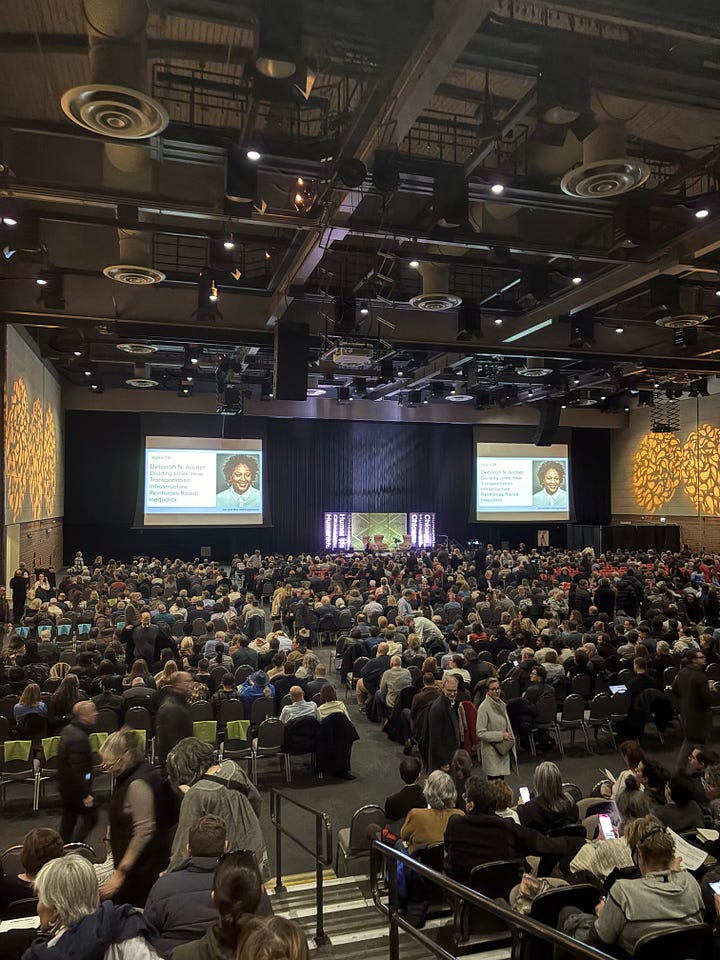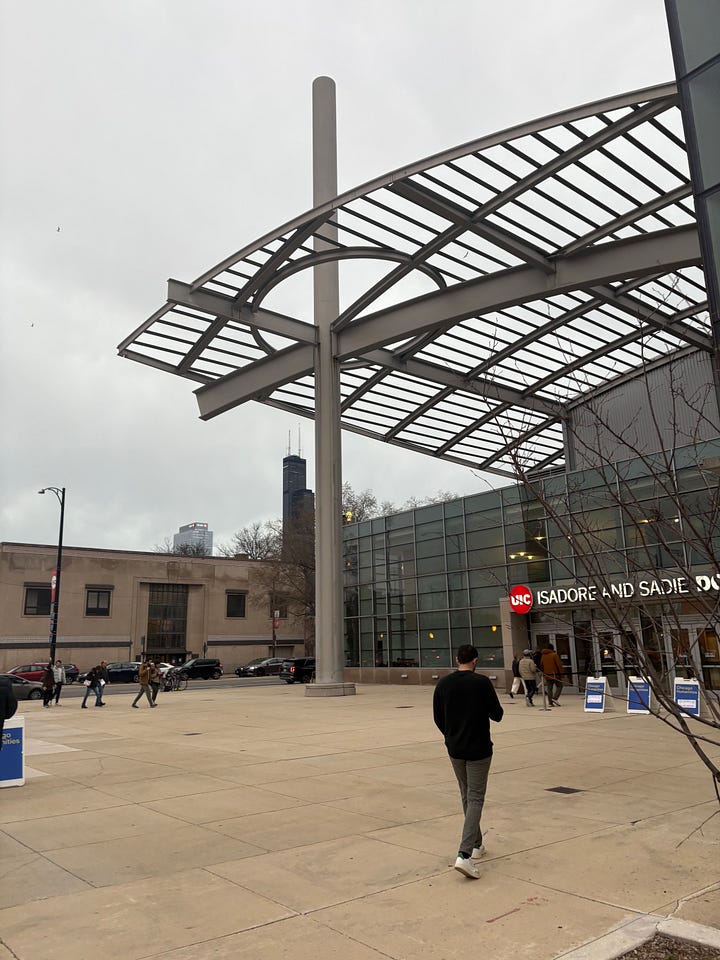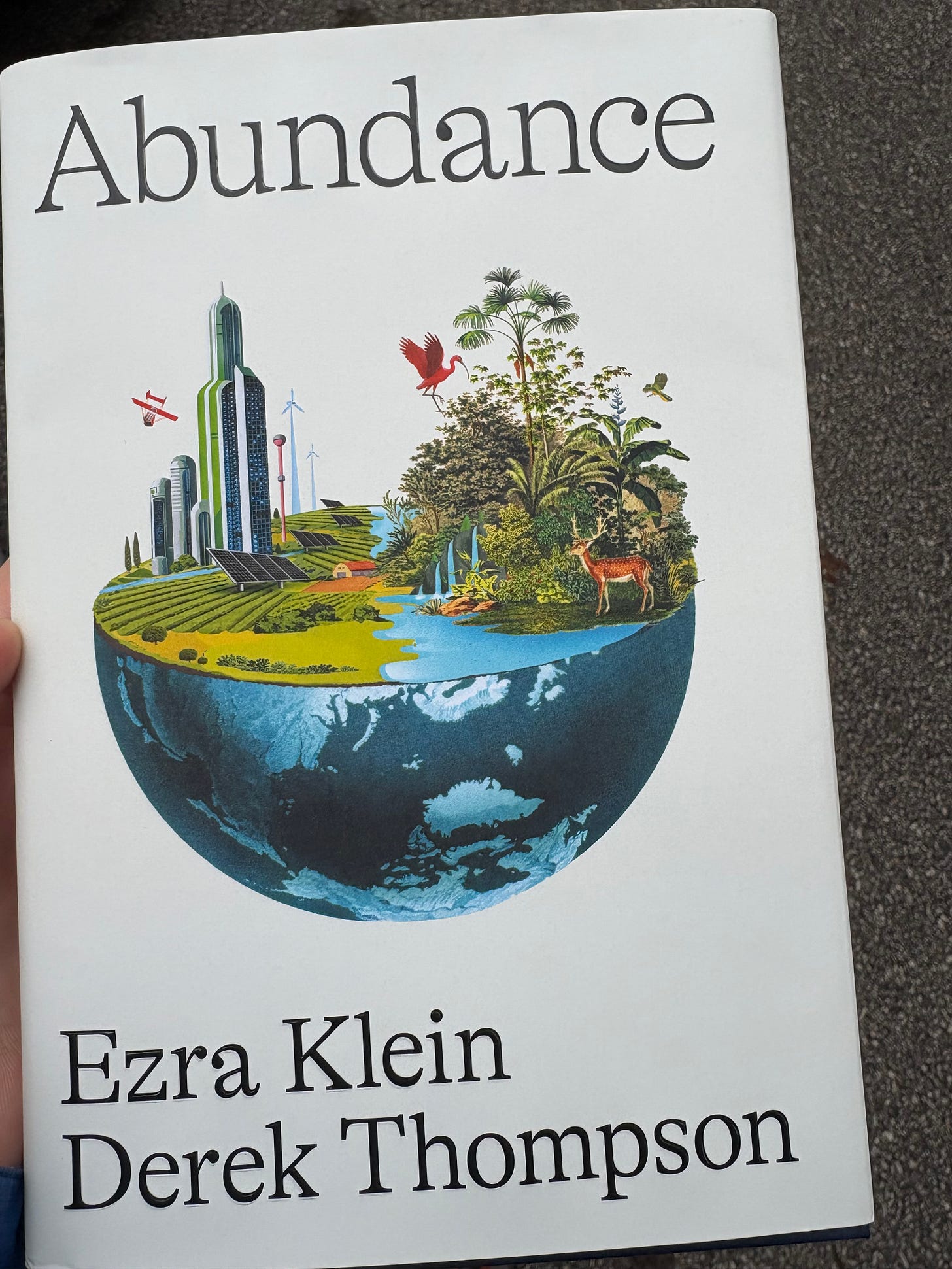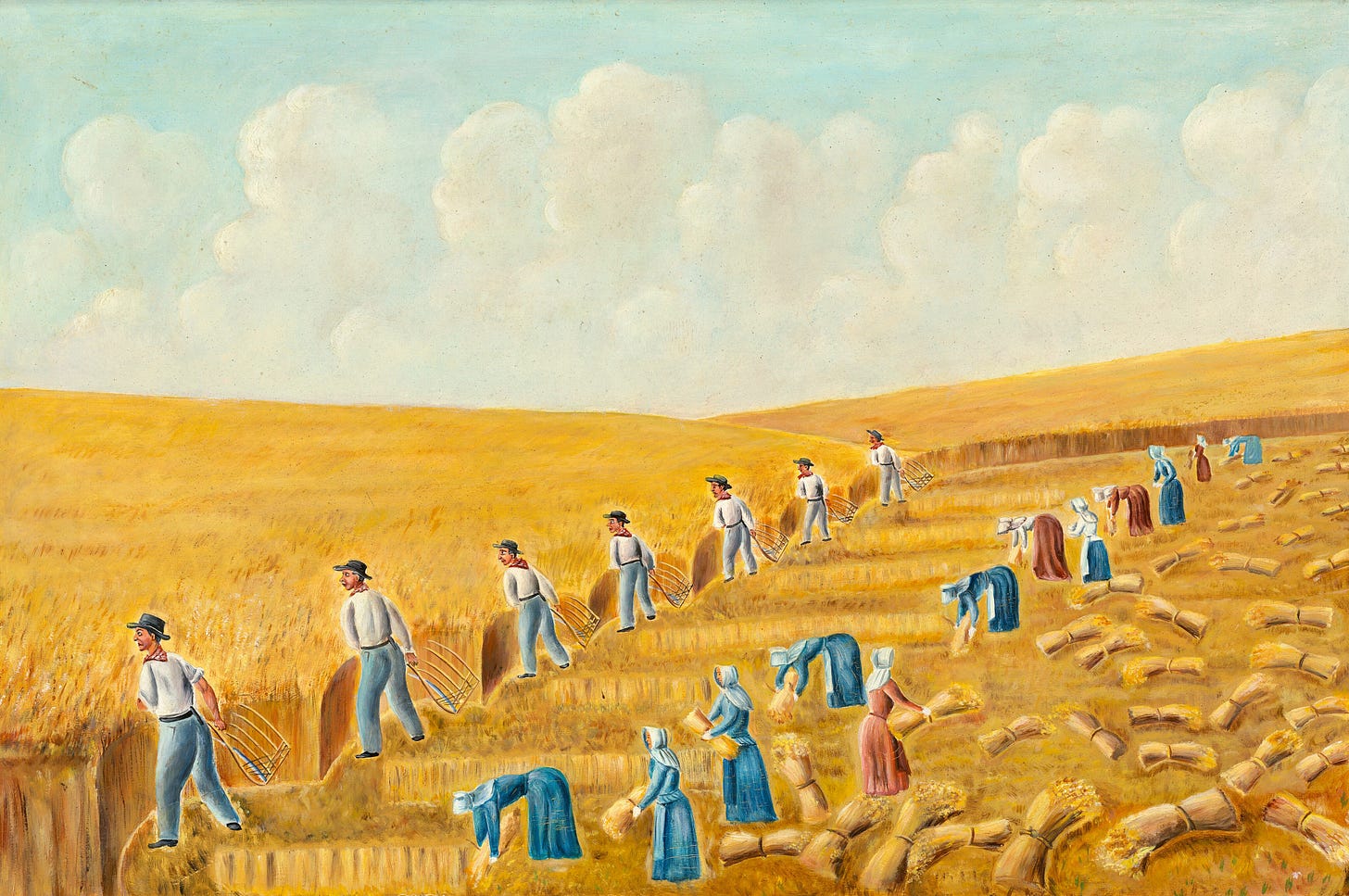In the amazing new book, Abundance, by Ezra Klein and Derek Thompson, they start with a science fiction vision of the future in the year 2050. A few highlights:
“You live in a cocoon of energy so clean it barley leaves a carbon trace and so cheap you can scarcely find it on your monthly bill.”
“[Your fridge is full of crops that] grow vertically on tiered shelves inside a tall greenhouse… These skyscraper farms spare countless acres for forests and parks.”
“…these days, automated factories thrum in low orbit. Cheap rocketry conveys the medicine down to earth, where it’s saved millions of lives and billions of healthy years.”
All of this technology, of course, is totally possible. The only reason it feels like fiction is that our current politics has become mired in division, inaction, and stasis. But if we’re going to solve the problems of our day: inflation, housing shortages, and climate change (among others), we’re going to need renewal. We need new ways of doing things. A new agenda. A politics of abundance.
Not me at an IRL talk for actual smart people…
This week, I got the chance to see these wordsmiths live. They’re on a book tour, and they came to the Chicago Humanities Festival put on by UIC. I joined the other wonky hopefuls as we crammed into an amphitheater with our tiny cups of chardonnay to see the show. And, boy, was it something. I don’t think I’ve ever seen so much spontaneous clapping – and all for ideas.


The talk was deeply philosophical – including a surprising number of Hamlet quotes since their interviewer, Ada Palmer, is an expert on the Renaissance. However, I also think philosophy is what we need right now. While many of us are frustrated with the way government currently works, as Ezra says often, that government is also rooted in a theory of how things should work. We created many of the processes we now need to renew, and that requires a new spiritual goal for what government does and why.
How we got here
While the authors have a meaningful vision of the future, they also do an excellent job connecting the present to the past. And the thing is, everything about our current system was done on purpose. In the 60s and 70s, we were facing a very different set of problems. America had built and grown extremely quickly after WWII. The result was toxic skies and rivers full of sludge. After all, it was so bad, Richard Nixon of all people signed the Clean Air Act into law in 1970.
This introduced new rules like environmental review and ample local zoning boards. However, the changes we made also took on a new philosophy – a philosophy of slowness. As the theory went, by layering the building process in tons of new procedures, we could use slowness to hopefully discover new information and prevent harm. Unfortunately, this also reflected the neoliberal impulse to “denigrate the state and elevate the individual.” We didn’t want government to be able to build anymore, so we gave ourselves the ability to stop it.
And this wouldn’t necessarily be bad on its own. For example, it’s vitally important to protect endangered species and wetlands. However, Klein and Thompson show time and again in the book that much of the processes we’ve created are also stopping the very things we need to thrive. These layers of review also, unfortunately, frequently fail to help the environment.
They cite many examples: Strip mall owners who claim historic building protections for ugly buildings just to stop housing. Environmental review stopping the building of trains even if the status quo is cars. NIMBY’s who claim their neighborhood should have the same number of houses as it did when the world population was 1/4 what it is today.
Essentially, we’re treating the built environment the same way we’re treating wild lands. But as Derek said at the talk, cities weren’t meant to be museums. And if we want 25-year-olds to stop spending 75% of their pay checks on rent, we’re going to need more places to live.
That doesn’t mean, of course, that we shouldn’t have standards. They’re simply proposing a philosophical shift away from stopping literally everything via endless lawsuits. They’re proposing prioritizing good things – and we get to decide what those things are. Maybe we shouldn’t have the exact same regulations for building an oil refinery as we do for building solar farms. Otherwise – and with great irony – the environmental movement of the 1970s is going to keep blocking the environmental movement of the 2020s.
BYD – Blasters set to stun
Thinking about EVs recently – as I tend to do – I realized they’re another area where we desperately need a politics of abundance. Two weeks ago, BYD, the Chinese electric vehicle giant, announced a new lineup of ultra-fast charging EVs. They will have an astonishing 1,000 kilowatt charging speed, allowing for five-minute charge times – the true equivalent of filling up a gas tank. That dwarfs the Hyundai Ioniq 5’s seventeen-minute charging speed, and is roughly 20x faster than my old Chevy Bolt used to charge. It’s even nearly 10x faster than a Tesla Model 3.
Even more importantly, though, BYD pledged to build 4,000 of the new stations required to deliver those charging speeds across China. You can’t buy BYD cars in the US really, but they’re also famous for making ultra-cheap models like the $9,700 seagull. It’s an absurdly low price, like something my grandpa would have paid for a car in the ‘60s.
And the thing is, we have every reason to think China will get this done. They’ve supercharged their domestic automative industry, and they’re rapidly deploying climate tech on a scale unseen across the world. Ezra recently made the point that there’s a lot of reasons we don’t want to be China – authoritarianism, local debt crises, bulldozing through villages to build. Still, we should ask ourselves what kind of building we do want. What would American progress on this scale look like?
Obviously, we have our own cultural problems when it comes to EV’s. Trump, for one, hates them. We also have a lot of rootin’ tootin’ big boys who love their diesel toys. That’s hard to supplant. However, I have a feeling if we had a $9,700 car in the US, people would buy it even if it ran on human blood. And that’s why the politics of abundance is so important. Driving an EV can cut your emissions by an absurd amount (compare your current gas model here). But if it comes with a crazy price tag or a nerve-wracking charging experience, that’s not making it abundant nor easy for normal people just trying to live their lives. I want so many EVs and so much charging infrastructure that it’s absurd NOT to drive one.
Hope vs despair
Perhaps the most valuable thing a politics of abundance can give us, however, is hope. Just as we see in the climate movement, when people feel despair, they simply give up. But the truth is, every time things have been good in history, it’s because people rolled their sleeves up and did the work. As Derek said at the talk, “the universe is sensitive to effort.” The more you point yourself in the right direction, the more you have a chance of getting things right.
Ezra, however, went on to say that he isn’t a big believer in hope as a strategy. What he cares about is curiosity. Fundamentally, if you allow yourself to be curious about the future, you open yourself to the unexpected. Meanwhile, when you have a purely static view of the present, you shut yourself off from what’s actually possible. And this is where we are in politics now. We’re simply trying to redistribute a present we no longer like. Redistribution is still important to discuss in terms of rampant inequality, of course. However, if we don’t have a strategy for creating a future we actually want, we’ll continue feeling stuck.
What you can do
Thankfully, if you like the way this kind of future sounds, there’s actually a lot you can do to make it a reality. The first thing, of course, is to believe in abundance. You can change your mind about how things get done. You can lean into the possibility that this country can build things if we change our theory of government. Speed – and not delay – needs to be our bigger virtue. Maybe we’ll lose the knowledge of delay, but we’ll gain the knowledge of iteration.
Second – and I swear this isn’t just teeing up my last Substack – you can get involved in community. At the talk, Ezra paraphrased Machiavelli who said that any political process eventually curdles, becoming part of the problem itself. And that’s what we did to zoning boards. Now, only NIMBY’s and lobbyists show up to town halls. But you can be engaged in community too. You can be a YIMBY and get out there screaming for more – more housing, more clean energy, more trains. Politicians need to hear the voices of people in support of doing something. As Ayana Elizabeth Johnson said on her latest podcast, Playing the Long Game on Policy Change, Congresspeople are most influenced by the people who actually show up.
Third, you can support the policies we need to get things done. Especially on climate change, one of the most needed changes right now is permitting reform. It takes too long to build new clean energy resources, and the longest part of the process tends to be getting permits. Last year, there was even an attempt in Congress to pass bipartisan permitting reform before the election. This was ultimately scuttled. However, I’m positive permitting reform will be a topic that comes back around. If you want to know when it’s time to call your Congressional rep non-stop, you can sign up for Citizens’ Climate Lobby’s emails and get the green flag next time a bill is in play.
But more than anything, you can be a person who’s curious about the future. Online, we get trapped in echo chambers, thinking everything is awful. (As Derek put it, quoting Hamlet, “I could be bounded in a nutshell and count myself a king of infinite space.”) Meanwhile, the digital sphere runs on negativity. Quoting a study from Jay Van Bavel and others, they found that each negative word in a headline increases click rates by 2.5%. But when you engage with people in person, what you find is a lot more nuance – and a surprising amount of positivity. So, show up, engage with people, and ask them about the future they want.
Blasting off toward our bright, shining future
More than anything, I want you to live abundantly, friends. I want you to never have to worry about climate change again because we built so much clean energy you can’t even keep track of it anymore. I want you to have a house you love and enough money for eggs. I want you to feel good about passing the baton to the next generation knowing you planted the seeds.
Ada Palmer called this “cathedral thinking.” In Florence in the 1300s, builders started the foundations for the Cathedral of Santa Maria del Fiore that had no way of being completed yet. The dome needed to cap it was simply impossible at the time. And yet, they trusted that human ingenuity would find a way to build that new dome when the time came. Similarly, in the 1800s in New York, Peter Cooper put elevator shafts in his buildings before elevators had been created, trusting the world would invent a way to go up and down without stairs.
Cathedral thinking requires a belief in the future. It requires a politics of abundance. I hope, long after I’m gone, my nieces and nephews are running around with technology I could only dream of. We all deserve that future. Now, let’s go get it.
With love,
JH
*Cover art by Stanley Mazur, after Olof Krans, Harvesting with Grain Cradles, c. 1939, courtesy National Gallery of Art
**Email header art by Karl Nilsson (sigvardnilsson on instagram), includes portions of Beck's Castle Ruins by László Mednyánszky Denbigh Castle, W he ales by Edward Dayes & Paysage de la Grand Chartreuse attributed to Jean Lubin Vauzelle






I got into climate advocacy because of Star Trek and Becky Chambers' books. I want a future more like those, and addressing climate change seems like the biggest opportunity to push ourselves there.